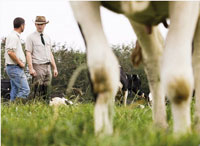Employment costs may be higher than expected

It used to be easy. The Agricultural Wages Board defined the minimum pay for farmworkers depending on skills, seniority and responsibility, giving employers a benchmark for basic wages and a price floor for farmworkers. Everyone knew where they stood.
It was not without its critics and had increasingly become seen to be anachronistic, particularly as farm businesses moved to salaries and offered more comprehensive packages to retain employees.
The last AWB order for England, agreed in June, will see a 2.8% pay increase and a minimum wage of £5.95 an hour for grade 1 workers, with effect from 1 October.
At the time it was agreed, a spokesman for the trade union Unite said: “This country has enjoyed decades of settled and harmonious industrial relations in agriculture because of the role of the board. If it was removed pay bargaining would be instantly fragmented and every farmer who employs people would have to become a wage negotiator overnight.” That is exactly what has happened.
With the AWB set to be removed, and in an industry only gradually becoming aware of the skills shortage that faces it, farmers should be prepared to face far higher employment costs, says Adrian Cannon, farm business consultant at Strutt & Parker.
“The cost of employing someone can mount far more quickly than most realise. It’s not just the AWB minimum rate multiplied by 52. And most general farmworkers are far more interested in what the complete package will offer them than just the basic wage,” says Mr Cannon.
“And you need to think about things like paying council tax, providing firewood – historically things one would expect in an employment package.”
Training
Prospective farmworkers will also be looking for an employer who is willing to invest in their future, and make provision for essential training and time away from work.
“This is so often overlooked,” says Mr Cannon. “Agricultural workers tend not to move very far geographically unless they’re exceptionally driven, but farming today does require specialist skills particularly in sprayer and combine operation and employers need to equip staff with these skills.”
To sceptics this might sound like gilding a perfectly good lily, particularly where a salary is offered or a significant premium to AWB wages is paid. But it’s money well spent, as it can make the difference between retaining the best staff and the expense of replacing them, Mr Cannon says.
Vacancies
If you do need to recruit new staff, don’t count on finding individuals of the required standard within days.
“The time elapsed when a team isn’t at full strength can cause further problems, if remaining people are stretched, particularly during harvest or cultivations. It can often take up to three months to successfully recruit the right individual.”
And although the business might not be funding an employee’s wages every month, it will suffer because it lacks that person’s productivity.
In addition to the cost of advertising, selection and interviews will make a significant demand on management time, says Mr Cannon. “Say you interview six people, including taking them round the farm – that will quickly eat up most of two days.” Add further hours spent in chasing up references, he says.
Package offered
On top of the AWB starting wage of £13,334 a year, expect to add about £5000 a year in overtime (often more), Employer’s Liability Insurance at 1% and Employer’s National Insurance Contribution at 12.8%. The total salary is now approaching £20,000 a year.
But that’s a conservative estimate, says Mr Cannon. “I would suggest £24,000-25,000 is more accurate in terms of the total cost to the business of employing a fairly typical general farmworker, given that you may be offering a premium over AWB rates.”
Houses
“It still seems that people feel they must offer a house with a job, although that needn’t be the case,” says Mr Cannon. “However, if you’re not providing accommodation, you can expect to have to increase the salary offered quite significantly.”
Employers should also consider the opportunity cost of allowing employees to occupy houses that could be let for a rental income. A cottage that might garner a commercial rent of, say, £600 a month, means an opportunity cost of £7200 a year. On top of that, consider things like council tax, mobile phone provision and use of a vehicle, Mr Cannon says.
Contracts
Above all, it’s important to have a written contract of employment which refers to AWB if using that as the benchmark, he says.
“Consider also things like annual staff appraisals. Often better conducted by a third party, these can be a valuable opportunity to air grievances, address concerns on both sides and plan for the future.”
Typical labour cost – Grade 2 (standard worker, normal hours)
• Minimum wage* £256.62 a week, £13,334 a year |
|---|
*Based on AWB rates 1 October 2010)
**Premium based on DEFRA surveys of employees’ rewards.
(Source: John Nix Farm Management Pocketbook 41st edition)
